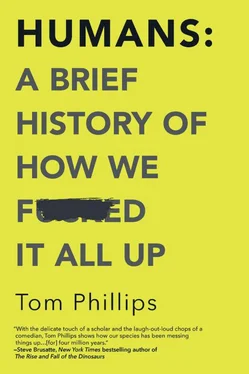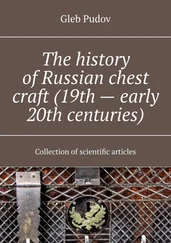Tom Phillips - Humans - A Brief History of How We F*cked It All Up
Здесь есть возможность читать онлайн «Tom Phillips - Humans - A Brief History of How We F*cked It All Up» весь текст электронной книги совершенно бесплатно (целиком полную версию без сокращений). В некоторых случаях можно слушать аудио, скачать через торрент в формате fb2 и присутствует краткое содержание. Город: Toronto, Год выпуска: 2019, ISBN: 2019, Издательство: Hanover Square Press, Жанр: История, Юмористические книги, на английском языке. Описание произведения, (предисловие) а так же отзывы посетителей доступны на портале библиотеки ЛибКат.
- Название:Humans: A Brief History of How We F*cked It All Up
- Автор:
- Издательство:Hanover Square Press
- Жанр:
- Год:2019
- Город:Toronto
- ISBN:978-1-48805-113-5
- Рейтинг книги:4 / 5. Голосов: 1
-
Избранное:Добавить в избранное
- Отзывы:
-
Ваша оценка:
- 80
- 1
- 2
- 3
- 4
- 5
Humans: A Brief History of How We F*cked It All Up: краткое содержание, описание и аннотация
Предлагаем к чтению аннотацию, описание, краткое содержание или предисловие (зависит от того, что написал сам автор книги «Humans: A Brief History of How We F*cked It All Up»). Если вы не нашли необходимую информацию о книге — напишите в комментариях, мы постараемся отыскать её.
Humans: A Brief History of How We F*cked It All Up — читать онлайн бесплатно полную книгу (весь текст) целиком
Ниже представлен текст книги, разбитый по страницам. Система сохранения места последней прочитанной страницы, позволяет с удобством читать онлайн бесплатно книгу «Humans: A Brief History of How We F*cked It All Up», без необходимости каждый раз заново искать на чём Вы остановились. Поставьте закладку, и сможете в любой момент перейти на страницу, на которой закончили чтение.
Интервал:
Закладка:
That’s… not quite how it played out. For starters, Spain didn’t have to attack directly. If the English attempts to thwart Scottish ambitions had been damaging beforehand, it was nothing compared to what happened now. The Spanish swiftly and diplomatically let King William know that Scotland’s little venture was exactly the sort of shit wars get started over. Having only just extracted himself from one of England’s regularly scheduled wars with France, William was desperate to maintain peace with Spain, and so he immediately issued orders that no English territory or ship was to supply, give aid to or even correspond with the Scots in any form.
When news of this reached Caledonia, it sent the settlers into despair. They’d had no news from home since they arrived, no fresh supplies had come despite regular pleas sent back to Scotland—and now they were entirely cut off, with any hope of finding allies in the region dashed.
Before the English embargo even came down, the colonists had already fought off one small Spanish strike, which they’d been warned of in advance by the captain of an English ship sent to spy on their activities. (Humiliatingly, he’d actually arrived in the area before them, because the Company’s attempts at secrecy had been so inept.) That small victory improved morale for a while, but was canceled out when one of their ships was seized by the Spanish while it was out looking for people to trade with, its crew thrown in jail and its cargo seized.
Now, with half the population of Caledonia dead, dying or imprisoned and the other half exhausted, starving and hungover, the news that they were completely isolated was the last straw. Believing themselves entirely abandoned, en masse they opted to abandon Darien and make the sad journey home.
And so a mere nine months after William Paterson had finally arrived in the place he’d dreamed of for much of his life, widowed and now sick himself, he was carried on board a ship preparing to leave it. He survived the fever, but he would never see Darien again.
Still ravaged by sickness, the colonists’ journey home via Jamaica and New York was as awful as their time on Darien had been. It took them almost a week just to get out of the harbor, and hundreds more died en route. One ship sank, and another was nearly destroyed. In the end, only a single ship would limp all the way back to Scotland. Where, unfortunately, it didn’t arrive in time to prevent a second fleet sailing to Darien to find out what had happened to them.
That’s right, the Company of Scotland had finally decided to send the long-overdue reinforcements, just when it was too late.
This second fleet arrived at the end of November 1699 to find a “howling wilderness”: the abandoned and burned-out remains of New Edinburgh, an overgrown fort and a large number of shallow graves. Against all reason, the new arrivals decided to stay, rebuild and try to hold on to the land while sending for fresh supplies. All this actually achieved was yet more of them becoming sick and dying, and gifting Spain the opportunity to prove they were no faded power. A few months into the new century, the Spanish arrived in force to remind everyone who was still boss. Ravaged by fever, the Scots somehow managed to hold out under siege for a while, but by April they were forced to surrender. The Scottish Empire was over.
Possibly understanding the propaganda value of a defeated enemy fleeing with their tails between their legs, or maybe just feeling sorry for the poor bastards, the Spanish allowed the settlers to go. Once again, hundreds died of fever on the journey back. A violent storm destroyed a further two ships with the loss of a hundred more souls—including the remarkably unlucky accountant Alexander Hamilton, who having made it back to Scotland despite his first shipwreck had then opted to return to Darien with the second fleet.
In total, somewhere near 3,000 people had sailed from Scotland for Darien. Between 1,500 and 2,000 are thought to have died either in the bay of Caledonia or on the seas. Many of the survivors never returned to Scotland.
Back in Edinburgh, the failure of the scheme prompted waves of shock as the news trickled back over the course of 1700. In a newly polarized political environment, the issue became a political football, with reaction split between those blaming the Company’s directors for their shameful failure, and those blaming the perfidious English for their interference. There were riots in Edinburgh in support of the Company. One disgruntled colonist whose pamphlets tore into the directors of the Company was accused of blasphemy; three Company supporters who produced a derogatory engraving attacking the government were unsuccessfully tried for treason. It didn’t really matter what the facts were anymore—it was all about which side you were on.
The effect was not merely political, but financial: in the midst of an economic crisis, a significant percentage of the country’s total wealth had been thrown away. The individual investors had lost large sums with seemingly no hope of return. Scotland had been humiliated and weakened.
Of course, no major political change happens only for one reason. The forces pushing Scotland toward a full union with England were complex, and didn’t just spring into existence in the wake of Paterson’s foolhardy scheming. This was the end of the seventeenth century, after all, when borders and alliances seemed to change every other week. But Darien sure as hell contributed to it—particularly when, as part of the union deal a few years later, it turned out that England was offering Scotland a bailout. Not just for the country; for the individual investors in the Company of Scotland, who would receive their original stake back with a generous sum of interest.
Many called it a bribe. “We’re bought and sold for English gold,” as Burns would write eight decades later. Some saw the whole affair as a dark English plot to cripple Scotland to the point where it would have no options left. Others were just happy to have their money back.
Paterson argued in favor of union.
In May 1707, the United Kingdom came into existence. In August, a dozen heavily guarded wagons containing almost £400,000 rolled into Edinburgh.
The thing about all this is: Paterson wasn’t wrong, not exactly. Panama really was an excellent site for a colony—indeed, archaeologist Mark Horton surveyed the isthmus in 2007 and concluded that Paterson’s proposed trade routes from Darien were actually realistic. And his forecast of how global trade would develop doesn’t sound so far off the mark today, either; what’s more, he explicitly promoted it as a nonviolent alternative to the atrocities of empire, writing that trade could bring wealth without “contracting such guilt and blood as Alexander and Caesar.” Which frankly for the time makes him almost kind of woke. (Although let’s not go overboard: gleeful talk of Darien’s untapped gold mines indicates that plenty of the scheme’s backers were in this for the plunder of natural resources.)
What really doomed the venture was a collective failure on the part of the scheme’s backers to grapple with difficult questions. They brushed aside the details, such as the type of ships they’d need and what supplies to take; they simply ignored the big picture, like the geopolitical implications of their actions. Instead, when setbacks or pitfalls emerged, they ended up believing their own hype and convincing themselves ever more strongly that they’d been right all along. It was a classic case of groupthink.
To this day, the story of Darien is one that divides Scotland. During the 2014 referendum on independence, it became a metaphor for both sides. For the nationalists, a parable of how England had always sought to sabotage and oppress Scottish hopes; for the unionists, a lesson in the dangers of abandoning stability in favor of unrealistic ambitions.
Читать дальшеИнтервал:
Закладка:
Похожие книги на «Humans: A Brief History of How We F*cked It All Up»
Представляем Вашему вниманию похожие книги на «Humans: A Brief History of How We F*cked It All Up» списком для выбора. Мы отобрали схожую по названию и смыслу литературу в надежде предоставить читателям больше вариантов отыскать новые, интересные, ещё непрочитанные произведения.
Обсуждение, отзывы о книге «Humans: A Brief History of How We F*cked It All Up» и просто собственные мнения читателей. Оставьте ваши комментарии, напишите, что Вы думаете о произведении, его смысле или главных героях. Укажите что конкретно понравилось, а что нет, и почему Вы так считаете.












